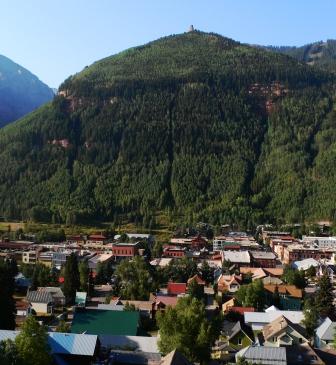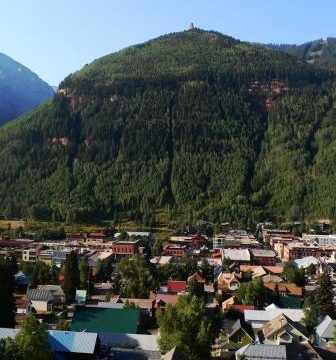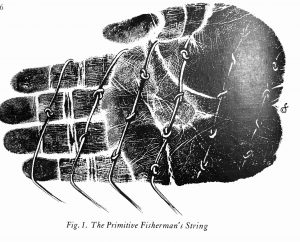SMALL TOWN, FEW PEOPLE
China Tells You How To Cope With Quarantine

Little town, fewer people nowadays (Telluride)
A Chinese classic, the Tao Te Ching by Lao Tzu, offers a wise thought experiment for our pandemic times. Here is my literal translation of Verse 80 with updates in brackets:
- Little country, few people
- [Small mountain town, closed to tourists]
- Devices that can do the work of 10-100
- [Power tools]
- Go unused
- [Construction has stopped]
- The people respect death
- [Deadly communicable virus]
- Remote are thoughts of travel
- [They don’t even think about leaving town]
- Boats and carriages: no one rides them
- [All vehicles remain parked]
- Tools of war: not displayed
- [No Fourth of July parade]
- They return to tying knots
- [Square knot, clinch knot, clove hitch]
- And putting them to use
- [Tie scarf, attach dry fly, fasten carabiner]
Here is the rest of the verse in translation by Ursula Le Guin, the late science fiction writer:
- They’d enjoy eating,
- take pleasure in clothes,
- be happy with their houses,
- devoted to their customs.
- The next little country might be so close
- the people could hear cocks crowing
- and dogs barking there,
- but they’d get old and die
- without having been there.
Well, the quarantining won’t last that long, but imagine this: the global collapse might take a lifetime to recover, and some poor little countries under permanent martial law (edible dogs and chickens scarce) won’t be fit for visitors.
Le Guin, daughter of anthropologists, often wrote stories against a backdrop of cultural conflict. For example, the protagonist in her novel “The Dispossessed” is surprised on visiting a highly developed for-profit planet that its people use possessive pronouns like mine and yours and have gender-specific personal names.
In the spirit of Anthro 101 she commented in a note to Verse 80 that, like tools, “We’re used, our lives shaped and controlled by our machines, cars, planes, weaponry, bulldozers, computers. These Taoists don’t surrender their power to their creations.” She puts her own titles on the chapters of the Tao Te Ching, and this one is titled: “Freedom.”
Freedom from what? Here’s a quote attributed to her that is often shared:
“We live in capitalism. Its power seems inescapable. So did the divine right of kings. Any human power can be resisted and changed by human beings. Resistance and change often begin in art, and very often in our art, the art of words.” And another: “Capitalism’s grow-or-die imperative stands radically at odds with ecology’s imperative of interdependence and limit.”
Half the verses in the Tao Te Ching are political. And of these, I think, Verse 80 is the most subversive. It was written during the Warring States period that ended in 221 BCE when the Qin emperor conquered them all, creating China. He is credited with today’s two most popular Chinese tourist attractions — the Great Wall and the terra cotta army. They are big deals.
Conversely, Lao Tzu values simplicity. He confronted the consolidation of empire just as today’s minimalists confront globalization. In his little country with few people everybody walks, just as today’s hikers and runners refuse rides, I suppose. His imagined residents work by hand. They are secure in their homes and don’t need to bear arms, though they have them. Lao Tzu values the three jewels, which are, in Le Guin’s translation: mercy, moderation, modesty.
A timely critic of Taoism was Sima Qian (145-89 BCE?), the “Grand Historian” at the beginning of the Han dynasty. He said the little country with few people might be happy. “Yet if one were to try to apply this type of government, striving to drag the present age back to the conditions of primitive times and to stop up the eyes and ears of the people, it is doubtful that one would have much chance of success. . . . No Taoist going door to door could change human nature.”
But that is exactly what happened, temporarily. Medical workers, in effect, have gone door to door. We have stopped up our restive and gregarious nature. We have isolated ourselves in order to survive. We have done this locally, without help from the federal goverment.
We did turn to the nation state to do what it was supposed to do — establish health, safety and welfare. But the leader turned out to be an entertainer — the result of the long media tradition of presenting politics as entertainment. And so, a new political book by a network reporter who is also the president of the White House Correspondents is called “Front Row at the Trump Show.” Up front are actors like the author, Johnathan Karl, who has “covered” Trump since 1994 when he did the young reporter a big news favor.
Lao Tzu does not think jokers make good leaders because thoughtless folks always laugh at the Tao, the way of virtue. They ridicule it, as they ridiculed Obama’s “leading from behind,” not knowing this Taoist concept. The glorious leaders up there on the stage have not read The Art of War. If they had, perhaps they would not talk about the Virus as an enemy to be shot down in a war. They would not have their scientists charging ahead in a hurry, damn the correlative casualties.
A film festival at a theatre many years ago in Manhattan had a problem. Movie goers like popcorn, but so do rats. The screenings were great and the audience was entertained until the rats came out in the dark.
The show goes on, the actors without a clue about the rats. Lao Tzu thinks a great leader understands the suffering of the people as he understands his own suffering — his body like the body politic. (OK: his/her body)
One more thing.
Verse 80 of the Tao Te Ching does not have you imagine that the few people in this little country strive to improve their minds. Even if they had the books of bamboo strips produced in that ancient Chinese era they would not read them. Practice, as a yoga teacher I know says, is not about “book learning.” And so Le Guin’s translation says of these people:
- Instead of writing,
- they might go back to using knotted cords.
She is repeating the usual interpretation of the knotted cord as a means of accounting. David Hawkins, an old Colorado University professor of mine, began his book The Language of Nature with a reminder that the high abstractions of mathematics are derived of arithmetic and that arithmetic is based on counting. An unschooled fisherman, for example, ties a knot in a cord for each member of his family. Then he catches one fish for each knot. Family and fish are sets.
Forget the math, even the accounting, for now. Ursula Le Guin’s old friend Lao Tzu is no dualist. “So,” her comment on Verse 80 goes, “enjoy your life, he says; live in your body, you are your body; where else is there to go? Heaven and earth are one.”all



I will try to find beauty in self-isolation.
Perhaps I will garden this summer.
If the snow ever melts here.
But miss my dear friend in the next little country.
This was lovely Larry! We can only hope that this extraordinary historical event will leave us wiser and more respectful
Hello,
I am constantly amazed and grateful for your extraordinary talent for bridging different sets of ideas, cultures, history. Thank you! You. Are a true scholar.